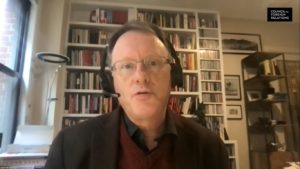
The geopolitical arguments between China and the USA are developing fast. Renowned economist Arthur Kroeber takes the stock right now as US treasury secretary Yellen visits Beijing, for the NPR. How can two major economies disentangle if they rely so much on each other?
NPR:
SCHMITZ: It’s been four years since a U.S. treasury secretary visited Beijing. And in that time, relations between the U.S. and China have worsened considerably. For years, these two economies really needed each other. To what extent is that still the case?
KROEBER: I think that’s still enormously the case. You know, all-time – trade is at an all-time high, over $700 billion. You have a lot of U.S. companies that still rely on China as one of their major markets, both for volume and for growth. So there’s definitely been some chipping away in certain areas, notably semiconductors. But the level of interdependence is still extremely high.
SCHMITZ: And, you know, the U.S. has been trying to disentangle itself from China more recently, you know, reshoring supply chains, placing controls on semiconductor technology, as you mentioned, you know, keeping Trump era tariffs on Chinese goods in place. I’m curious, how do you think this has shaped how China interacts with the rest of the world?
KROEBER: Well, I think the Chinese have come to the conclusion that it is the purpose of U.S. policy not just to reduce its reliance on China but to slow down China’s growth and its technological development. So it’s made China a lot more suspicious than it already was of U.S. intentions. So it’s created that problem. It’s also encouraged the Chinese to ramp up the charm offensive to international companies both from the U.S. and from Europe, and in other areas because they want to continue large inflows of foreign investment and looking for companies to act as a counterweight against political pressure that’s coming not only from Washington but also from Europe as well.
SCHMITZ: You know, to what degree does reduced dependence between these two superpowers increase the risk of greater hostilities or even conflict between the two?
KROEBER: Well, if we really get to a point where the economies are significantly less dependent on each other, I think that is a problem. And if you look at two simple examples from the last two decades – we’ve had an extraordinary period of peace over Taiwan, which is kind of disputed territory. And one of the reasons for that is because the high level of economic interdependence between China and the U.S. and Taiwan means that the costs of China trying to solve that issue by military means are extremely high.
I think you can also see that in the Russia-Ukraine situation, that China has an alignment with Russia. They would probably like to do more to help them in the current situation. But they’ve been very, very cautious about staying away from exporting weapons to Russia, again, because of the costs, because of their high interdependence. So I don’t think we’re at a low interdependence level yet.
Arthur Kroeber is a speaker at the China Speakers Bureau. Do you need him at your meeting or conference? Do get in touch or fill in our speakers’ request form.
Are you looking for more experts on managing your China risks? Do check out this list.
